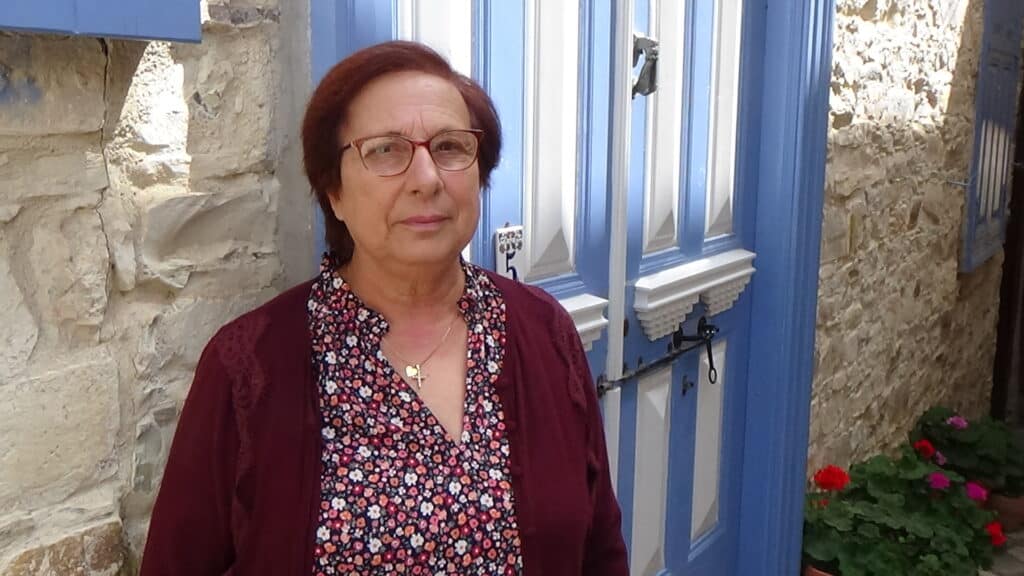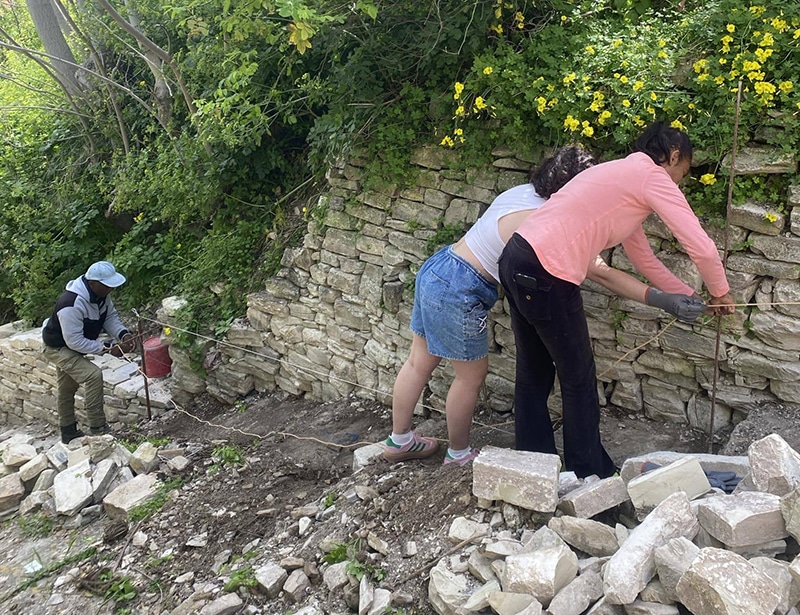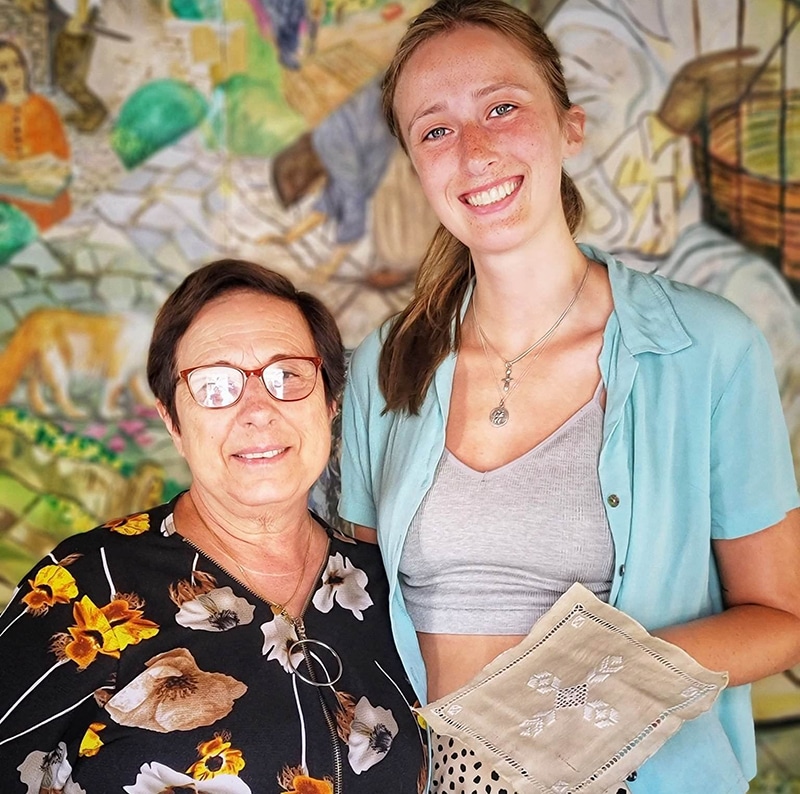
From a Birmingham fish and chip shop to the Cyprus village of Kato Drys, everyone knows Panayiota. THE PANAYIDES meets a restless lacemaker mourning the loss of local traditions
I first encountered Panayiota (Yiota) Demetriou four years ago in the village of Kato Drys, and was struck above all by her energy: a light-hearted, almost mischievous energy – not the kind you’d necessarily associate with the salt-of-the-earth ladies who make Lefkara lace, a.k.a. lefkaritika, part of our Intangible Cultural Heritage (as defined by Unesco) since 2009.
She’s a bit more nervous on second meeting, sitting in the Old Olive Mill in Lefkara over coffee and custard bougatsa – but the light-hearted spirit remains. “My voice won’t be in this, right?” she asks, panicking when I take out my tape recorder. “I’ve got a voice like a cat that someone trod on its tail!” A little later, her phone rings. “Can I call you in a bit? I’m doing an interview, your mother’s going to be famous,” she trills, laughing happily.
I didn’t catch her surname four years ago, and had some trouble tracking her down for this profile. In the end, I just decided to call the president of the Kato Drys community council and ask if he could put me in touch with ‘Panayiota the lacemaker’ – and of course he instantly, and none too surprisingly, gave me her number. Kato Drys is a small place, only about 150 people – it was 800 in her father’s day, 300 when she was a girl; the primary school she attended closed down 25 years ago – and everyone knows Panayiota.

She’s lived there all her life, except two years in Nicosia (she didn’t enjoy it) and 14 years in the UK, Glasgow then Birmingham. The latter requires some explanation. When Yiota was 16 (she was born in 1955), her father came to her with an unexpected offer: there was a half-Scottish boy whose family lived in Scotland but often came back to the village – his father’s village – on holiday. The boy (he was only 18 himself) had met her a few times, and liked her. An official proposal had been made for her hand in marriage.
“I was 16,” she says, then pauses: “I wouldn’t do it to my own kids. I have no complaint with my husband, but I wouldn’t do it to my kids”. Anyway, yes, “‘go to Scotland, great, get out of the village!’, that was my reaction,” she recalls, and laughs. Her only concern was that she didn’t know him very well – but her plan was to get engaged, make sure there were no obvious red flags, then get hitched later. Alas, it didn’t work out that way: “My dad was like, ‘She doesn’t leave my doorstep unless she’s married!’. In 17 days – engagement, marriage, Scotland. With a man I barely knew.”
The couple moved to Bishopbriggs, on the outskirts of Glasgow; she became pregnant soon after. (Her daughter was born in 1972; another child, a son, followed six years later.) Her father-in-law had a fish-and-chip shop, her husband worked; Yiota stayed home with the baby, pining for Cyprus. After a while, they moved to Birmingham to live with her brother, and saved their pennies to buy a home. They raised half the money, £2,000, and asked the bank for the other half – but the bank wouldn’t give them a loan (an uncle eventually intervened as guarantor), because they were still underage!
As a child, she’d learned embroidery (including lefkaritika, Lefkara being just up the road from Kato Drys) at her mother’s knee, but there was no time for that in the UK: “I had no hobbies”. She learned some English, started working – cooking the Cypriot dishes at El Greco, a local Greek restaurant, then alongside her husband when they rented their own fish-and-chip shop – and eventually got used to the life, more or less.
“Fish and chips. Salt and vinegar!” she calls out in English, and laughs at the now-distant memory. “There were nights when we’d close at two and I’d get up at seven, grab the kids, and go to school in the snow. But when you’re young…” She was lucky, she repeats more than once, that her husband turned out to be a decent man (they’re still married, 52 years later) when he could’ve turned out to be literally anything. “I was lucky, no drugs or anything. He was good. We had a good life.”
None of this was unusual at the time. Getting married at 16 was quite common, as indeed was leaving Cyprus – though the big exodus had taken place earlier, after WWII, when the area was crushingly poor. (The boom in Lefkara lace came later, with the tourists.) Yiota’s own dad didn’t emigrate, but it took all his resourcefulness to make ends meet: he was known as ‘Nicholas the chauffeur’ – he drove the first car in the village, actually a minibus – but was also a cobbler and “could do a thousand different things: fixing chairs, fixing clocks, doing welding, installing power”. She takes her restless spirit from her dad, reckons Yiota – but is good with her hands like her mum, who was known for her lacemaking skills and was hired by the “very rich girls” to embroider their dowry. And Yiota herself? “I always wanted to create, to learn, to do things.”
Her life was shaped by a time and place, the circumstances of her birth. What if she’d been born 40 years later, say? Not sure, she muses. “I’d like to have studied something, Fine Art and so on. But I think I’m a restless spirit – I couldn’t focus just on one thing. Like now for instance, when I teach a bit of everything, I love it.”
We’ve been joined by Martin Clark, a bluff, larger-than-life Englishman who’s had an outsize influence on Yiota’s life – especially the past decade or so, hence the reference to teaching. “In the past, I did the things that life forced me to do,” she admits – but things started to change in 2011, by which time she’d been back in Kato Drys for two decades, had opened (and closed) a successful restaurant, and had spent the previous decade renting a lace shop in Kato Lefkara, making and selling lefkaritika.

Martin came to the shop “holding a denim skirt”, looking for someone to embroider some Lefkara lace on it. He’d been turned down by most of the other salt-of-the-earth ladies, who refused to do anything so heretical, and Yiota had been recommended to him (correctly) as being “more open-minded”. It was, as they say, the beginning of a beautiful friendship. Martin runs Grampus Heritage & Training, organising EU-funded placements for young people in various places, including Lefkara where he’s lived for about 15 years – and Yiota is a valued partner in this enterprise, teaching the old ways (cooking, foraging and of course lacemaking) to students from all over Europe.
It’s not just training courses; they also make their mark on the local environment. A large mural on the way to the village was painted by Grampus students. This year’s crop are currently engaged in building a drywall (the old, sustainable way, without cement). Then there’s the Old Olive Mill, where we’re now sitting – a building that lay derelict for the best part of 50 years, before being turned into a cultural hub by Martin, Yiota and Co.
Every corner of the small space oozes creativity. There are masks made from gourds, improvised religious icons along the length of the room, handbags adorned with lefkaritika, a donkey made from recycled plastic. Downstairs there’s a stage and art-covered walls, amid the preserved remnants of the mill as it was. Yiota points out something else too: a small square of lace that’s a sample of ‘advanced’ lefkaritika, and took her three months to make.
Lacemaking was always in her life. “My mum, once we turned seven or eight, would sit us down next to her and we’d do the gazi (the border, or edging) first of all. Bit by bit we’d do the daisy without cutting, then we’d do the cut-thread. Because if you make a mistake – even just one thread – in lefkaritika, it shows. It’s maths, lefkaritika. ‘Geometrical’ (she says the word in English), it’s geometry.” She tries to illustrate, but it’s just too technical. The point is that, especially in a difficult piece like the square she showed me, even one mistake – even at the end, when you’re almost done – will wreck the whole design, so you measure every thread to ensure it comes out right. That’s why it takes so long.
Unsurprisingly, it’s a dying art. Only a couple of dozen women still embroider in Lefkara; in Kato Drys, she’s the only one left. (The lace sold to tourists is still handmade, she assures me, but from other parts of Cyprus.) “Girls have to work and make money,” shrugs Yiota; a lacemaker might spend all day on a piece, and earn about €10 for her trouble.
Things are changing in general. She shows me a corner of the mill where they had a break-in quite recently; you even hear of churches being robbed nowadays, she sighs. It’s not locals, she affirms patriotically, you won’t get a Lefkarite robbing a Lefkarite – but people too have changed, “life has changed in general. ‘Progress’, as we say”. One might assume that Yiota – a restless, creative spirit, behind the traditional trappings – was born in the wrong era, but in fact it’d be even harder to be born today, at least in Lefkara or Kato Drys. “Our young people want to leave,” she admits. “Kids are all educated now,” and the only jobs for graduates are in Larnaca or Limassol; their own kids are caught up in the whirl of endless private lessons – and living in a village is just impractical, even for the few who appreciate it.

Yiota is “a perfect example of somebody from a village who has a massive knowledge – the sort of knowledge that isn’t getting passed on to young people now,” says Martin, chiming in on the subject of change. Take foraging, for instance. She’ll often venture out into the fields, picking whatever’s in season (turpentine is big at the moment, and delicious with broad beans), or sometimes for medicinal purposes – but who’ll pick the wild greens in future, after her own generation has passed on?
“I can’t really see my daughter going out to pick them,” she admits.
Would her daughter even know what to pick, if she did go foraging?
“No… No, it’s over. I don’t have anyone.”
So the plants will just sit there?
“What can we do?” she replies. Yiota lives for her children and grandchildren – there’s even a baby great-grandchild – and they’ll happily turn off their phones and follow her into the fields, absorbing all the old village knowledge; but her son lives in Kiti and her daughter in Nicosia, they’re not there all the time. It’s the same as with lefkaritika, she muses: she’s far more likely to be teaching the craft to a girl from abroad than a girl from Cyprus.
“Isn’t it a shame? That our children should learn computers – okay, that’s good too, modern technology – but should we just forget about these [other] things? It’s all over?… I feel like my generation killed this, we didn’t pass it on. What I mean is, we won’t have tradition. Pretty soon, we won’t have tradition.” Yiota shakes her head, her natural good cheer subdued: “We’ll just be another European country soon”.
Panayiota Demetriou has the old village ways: the knowledge of food, traditions, culture – though also the graciousness, the prudence, the innate sense of modesty. Martin tells a cute story of her baby years – it appears that Yiota’s Eoka-supporting relatives would take the infant along when delivering arms to fighters, camouflaging guns in her swaddling – and she looks a little shocked, as if wondering what people will say. These days, a girl with her lively temperament might go to art school and end up moving to London, or having her own exhibition. Back then she got married at 16 and lived life as it came, trying to do as much as permitted by circumstances.
Sewing and embroidery feed her creativity – not just lefkaritika, she also knows crochet, cross-stitch, knitting, macramé. She likes to watch TV while keeping busy in the evenings, making this or that, adding clacking needles to the sounds of the quietly fading village where she’s lived (almost) her entire life. I say goodbye and walk to my car, past the donkey made from recycled plastic – then a sign for ‘Caution: Crumbling Building’ on a half-ruined old house, just across from the colourful mural painted by the young foreign visitors.